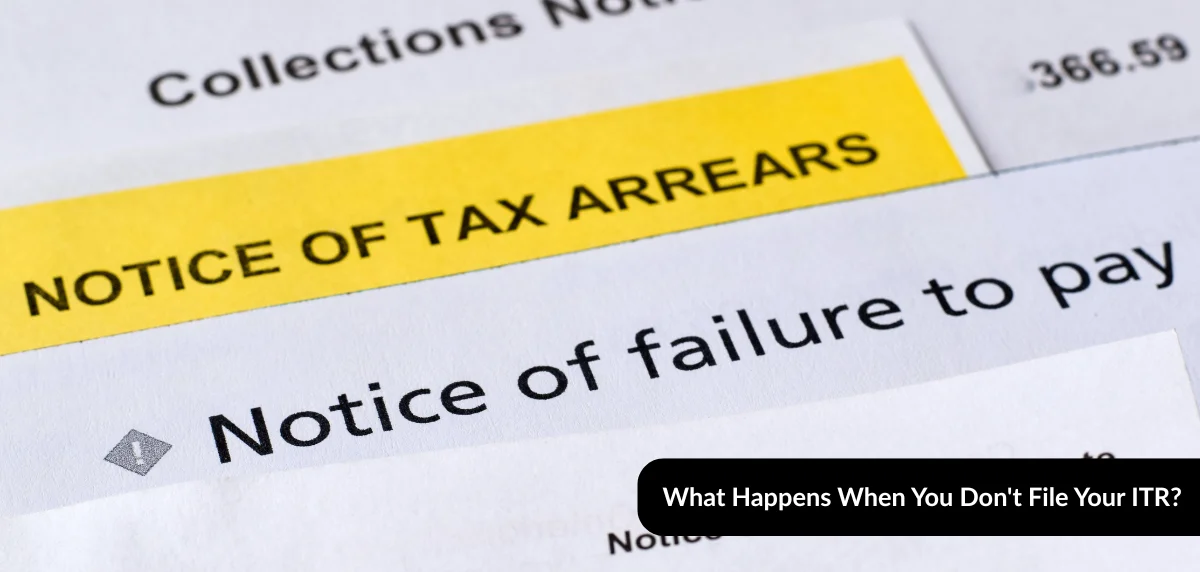Filing your Income Tax Return (ITR) is a legal requirement in India. Many people delay or skip it, thinking it is acceptable if they do not file their returns for a year or two. However, this kind of negligence can lead to various complications. So, what happens if you don’t file your ITR? From penalties to legal action, the consequences can be serious.
Read on to know more about what will happen if you don’t file ITR and why it is important to do so.
Consequences of Not Filing Your Income Tax Returns
Let’s understand what can happen if you don’t file your ITR or file it late. The Income Tax Department has set clear rules under the Income Tax Act for non-compliance:
1. Penalty Charges
One of the most common consequences is a late fee under Section 234F.
- If you file your ITR after the due date, you may have to pay a penalty of ₹5,000.
- If your total income is below ₹5 lakh, the penalty is reduced to ₹1,000.
However, you may not be liable for the penalty if your income is below the basic exemption limit.
2. Interest on Outstanding Tax
Under Section 234A, you are charged 1% interest per month on any unpaid tax amount if the return is not filed on time. This continues until the tax is fully paid on the due date.
Let’s understand this with an example:
Mr. Rohan, a freelance graphic designer, had an unpaid tax amount of ₹1,50,000 for the financial year. He forgot to file his ITR on time and ended up filing it 3 months late.
As per Section 234A, he is charged 1% interest per month for the three months on the unpaid tax.
So, the interest = ₹1,50,000 x 3% = ₹4,500.
This ₹4,500 will be added to his total tax liability.
3. No Carry Forward of Losses
If you have made losses in stock trading, mutual funds, or business, you can carry them forward to offset against future income (but only if you file ITR on time). But what if you don’t file ITR on time? You lose the right to carry forward most losses (except house property losses).
4. Prosecution for Non-Filing of ITR
Yes, not filing ITR can lead to jail time in extreme cases. If your tax liability is over ₹25,000 and you intentionally avoid filing ITR, you may face rigorous imprisonment of 6 months to 7 years (along with a fine). For lower tax amounts, the jail term can range from 3 months to 2 years, also with a fine.
5. Difficulty Getting Loans or Visas
When you apply for home loans, education loans, or even a visa, banks and consulates ask for the last 2–3 years' ITR documents. So, what happens if you don’t file ITR? You may face delays or rejection in such applications due to a lack of ITR proof.
6. Missed Refund Opportunities
If tax was deducted from your salary (TDS), you may be eligible for a refund in some cases. But to get it, you must file ITR. You lose the opportunity to claim your rightful refund if you do not file your ITR.
Why Is It Important to File ITR?
Now that you know what happens if we don’t file ITR, let’s understand why filing your ITR is so important (even when your income is below the taxable limit).
1. Helps with Financial Planning
ITR acts as proof of income, which is useful for planning your finances, investments, and applying for government schemes.
2. Required for Loans and Visa
Banks and embassies require ITR copies to verify your income. Regular filing improves the chances of approval on your credit and visa applications.
3. Claiming Tax Refunds
If excess tax has been deducted (TDS), you can only get it back by filing an ITR.
4. Proof of Income
ITR acts as an official document to prove your income. This is useful when applying for jobs, tenders, or government verification.
5. Avoid Legal Trouble
Filing ITR protects you from penalties, interest, and possible legal action, such as notices or prosecution.
So, if you are still wondering: what happens if I don’t file ITR on time?
The short answer is:
- You face financial penalties, loss of benefits, and possible legal issues.
- Also, you miss out on refunds and create complications for your future financial dealings.
Hence, it is advisable to file the appropriate ITR by the due date to continue enjoying smooth financial services and avoid paying penalties.
If you are unsure about what ITR is, which ITR form is right for you, how to file ITR, and so on, you can reach out to a tax expert or use online portals to understand the process better.
Filing your ITR is a financial habit that brings many benefits. What if you don’t file ITR? You risk penalties, interest, and legal trouble. Avoid complications by staying updated and learning how to file ITR on time. It is a simple way to stay responsible and protect your financial future.
























